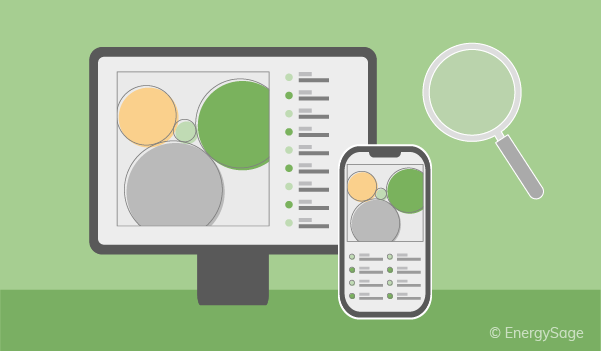
For most homeowners, purchasing an energy monitor is a great decision – but your upfront costs and long-term savings will largely depend on your chosen product! Not all energy monitors are created equal. We’ll explain a few factors you’ll want to consider when comparing your options to help you determine the best fit for your needs.
Appliance recognition
Some energy monitors use built-in artificial intelligence to learn specific device signatures of your appliances. Each appliance has a unique way of using electricity. Over time, these energy monitors will determine which appliances are running based on how they use your electricity. This “machine learning” period can take weeks to months, which can be frustrating if you want to start monitoring at the appliance level immediately. Ultimately, an energy monitor equipped with appliance recognition will make quick judgments on the detected appliances and, via your monitoring app, report on specific information and actions you can take on those appliances.
It’s important to remember that only some monitors have this feature, and the technology doesn’t always work perfectly for those that do. It’s usually easy for the monitor to detect differences between a TV and a refrigerator, but devices that use electricity similarly (think heating devices, like a toaster and a curling iron) may be more challenging.
Real-time cost tracking
Some, but not all, home energy monitors allow you to track the cost of your energy consumption in real time. Real-time cost tracking will let you watch as your electricity consumption and costs increase or decrease. You’ll also be able to see and understand the effects of turning devices on and off – such as keeping your TV on in the background. This feature can be essential for maximizing cost savings.
Mobile apps and notifications
Make sure that any energy monitor you choose has a mobile app component. This app should send you notifications about things such as which appliances are running, tips for further savings, and warnings on abnormal appliance behavior, which could help you proactively replace a malfunctioning appliance. If you want to receive notifications about a specific issue with your electricity use, confirm that your chosen product has that functionality.
Solar-ready monitor options
As we’ve explained, one of the best times to purchase an energy monitor is if you have already or are planning to install solar. If you fall into one of these categories, you’ll want to ensure that the monitor you choose is solar-ready, meaning it can monitor your solar electricity production. Energy monitors with this option allow you to see how much energy your solar panels generate, when they generate it, and how you use it.
Installation
Unless you’re familiar with your electrical panel, we recommend consulting an electrician for your energy monitor installation. Many home energy monitors market themselves as do-it-yourself, but any project attaching a device to your electrical panel will have shock hazards. Bringing an electrician to your house for the installation will increase the total cost of the equipment, but once installed, the devices allow for significant savings. Hiring a certified electrician for installation can provide confidence in your system.